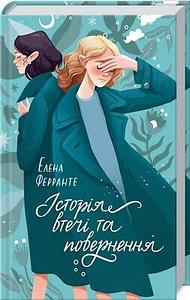Take a photo of a barcode or cover
My least favorite book of the series - at this point the hate/hate relationship was grinding me down and I was less invested in the outcome
This was the book that ruined the series for me. I couldn't bring myself to read the fourth.
Breathless from start to finish
The third of the Neapolitan Novels is by far the most difficult (so far) and yet, the biggest blow to one’s senses. The previous two novels were a touch slower; the first took me a long time to finally become invested in, and the second, though shorter than the third, still took me a little over a week to finish. I was nervous about the pacing of this one, clocking in at 400 pages, was unsure about how Ferrante would keep things moving without excessive filler. I need not have worried at all.
There are so many highlights I have in this book that, were one to read them on my Goodreads profile, they likely wouldn’t make any sense—they’re not particularly beautiful prose (at least, not all of them), but rather were passages that I felt deeply. In this novel more than the previous ones, I identified with Elena in ways that were haunting, that frightened me and sometimes made my throat full. The challenge of leaving a small town and that identity, of making something of oneself and being proud and thinking that others would be proud as well, only to find that family and friends and loved ones aren’t proud at all...that they are somehow angry at you for it, that all made too much sense to me. The feelings of impostor syndrome, of wondering if one made missteps that can’t be recovered, of going back to the same toxic friendships and relationships, willing them to be healthier, willing them to be what you had initially hoped them to be or willing them to replicate the best feeling they ever gave you, only to find out that these same relationships have always relied on manipulation...it was a difficult novel to recognize oneself in. It grows increasingly difficult to watch the tangled ways Elena seeks out love and validation from these people, to be both pleased for her when one person recognizes how intelligent she is, how much she has to offer, and calls that out in front of others, and then to also be so frustrated at her that she continues to invest herself in that validation instead of seeing herself outside of it, because these people continue to take advantage of that value for their own purposes.
Interwoven in the narrative is this incredible commentary on what it means to be a woman—not just in the 60’s/70’s where this is set, but in every day, in every decade, in every era. I was overwhelmed with how deftly Ferrante moves from identifiable narrative to the theory of male ownership of female identity. It’s littered throughout the pages, from start to finish: What identity does woman have that has not been foisted upon her by man? What lens does woman see herself through that has not been created by man? And how do we break free of that...how do we break free of the templates imposed onto our selves by the men in our lives, who THEY would be if they were to be women?
The entire book is striking. I wished, at times, that it was a book I could recommend on its own face, without the connection of the previous two, because it was THAT remarkable all on its own. I want to tell every woman I know about this book, I want to tell every man that it should be required reading for them, but I am not convinced that people would stay the course for the first two novels to get to this one (though they absolutely should.)
One of the best novels I’ve ever read. Ferrante is a tremendous writer who is committed, above all, to her protagonist...even when we are angry at her, we are often angry on her behalf, for not seeing herself the way we all see her.
The third of the Neapolitan Novels is by far the most difficult (so far) and yet, the biggest blow to one’s senses. The previous two novels were a touch slower; the first took me a long time to finally become invested in, and the second, though shorter than the third, still took me a little over a week to finish. I was nervous about the pacing of this one, clocking in at 400 pages, was unsure about how Ferrante would keep things moving without excessive filler. I need not have worried at all.
There are so many highlights I have in this book that, were one to read them on my Goodreads profile, they likely wouldn’t make any sense—they’re not particularly beautiful prose (at least, not all of them), but rather were passages that I felt deeply. In this novel more than the previous ones, I identified with Elena in ways that were haunting, that frightened me and sometimes made my throat full. The challenge of leaving a small town and that identity, of making something of oneself and being proud and thinking that others would be proud as well, only to find that family and friends and loved ones aren’t proud at all...that they are somehow angry at you for it, that all made too much sense to me. The feelings of impostor syndrome, of wondering if one made missteps that can’t be recovered, of going back to the same toxic friendships and relationships, willing them to be healthier, willing them to be what you had initially hoped them to be or willing them to replicate the best feeling they ever gave you, only to find out that these same relationships have always relied on manipulation...it was a difficult novel to recognize oneself in. It grows increasingly difficult to watch the tangled ways Elena seeks out love and validation from these people, to be both pleased for her when one person recognizes how intelligent she is, how much she has to offer, and calls that out in front of others, and then to also be so frustrated at her that she continues to invest herself in that validation instead of seeing herself outside of it, because these people continue to take advantage of that value for their own purposes.
Interwoven in the narrative is this incredible commentary on what it means to be a woman—not just in the 60’s/70’s where this is set, but in every day, in every decade, in every era. I was overwhelmed with how deftly Ferrante moves from identifiable narrative to the theory of male ownership of female identity. It’s littered throughout the pages, from start to finish: What identity does woman have that has not been foisted upon her by man? What lens does woman see herself through that has not been created by man? And how do we break free of that...how do we break free of the templates imposed onto our selves by the men in our lives, who THEY would be if they were to be women?
The entire book is striking. I wished, at times, that it was a book I could recommend on its own face, without the connection of the previous two, because it was THAT remarkable all on its own. I want to tell every woman I know about this book, I want to tell every man that it should be required reading for them, but I am not convinced that people would stay the course for the first two novels to get to this one (though they absolutely should.)
One of the best novels I’ve ever read. Ferrante is a tremendous writer who is committed, above all, to her protagonist...even when we are angry at her, we are often angry on her behalf, for not seeing herself the way we all see her.
I liked the themes of class struggle in addition to the powerful characters and prose that have come to define the first two books in the series.
challenging
emotional
reflective
tense
slow-paced
Plot or Character Driven:
Character
Strong character development:
Yes
Loveable characters:
Yes
Diverse cast of characters:
No
Flaws of characters a main focus:
Yes
challenging
emotional
hopeful
sad
slow-paced
Plot or Character Driven:
Character
Strong character development:
Yes
Loveable characters:
Yes
Diverse cast of characters:
Complicated
Flaws of characters a main focus:
Yes
dark
emotional
inspiring
reflective
sad
tense





